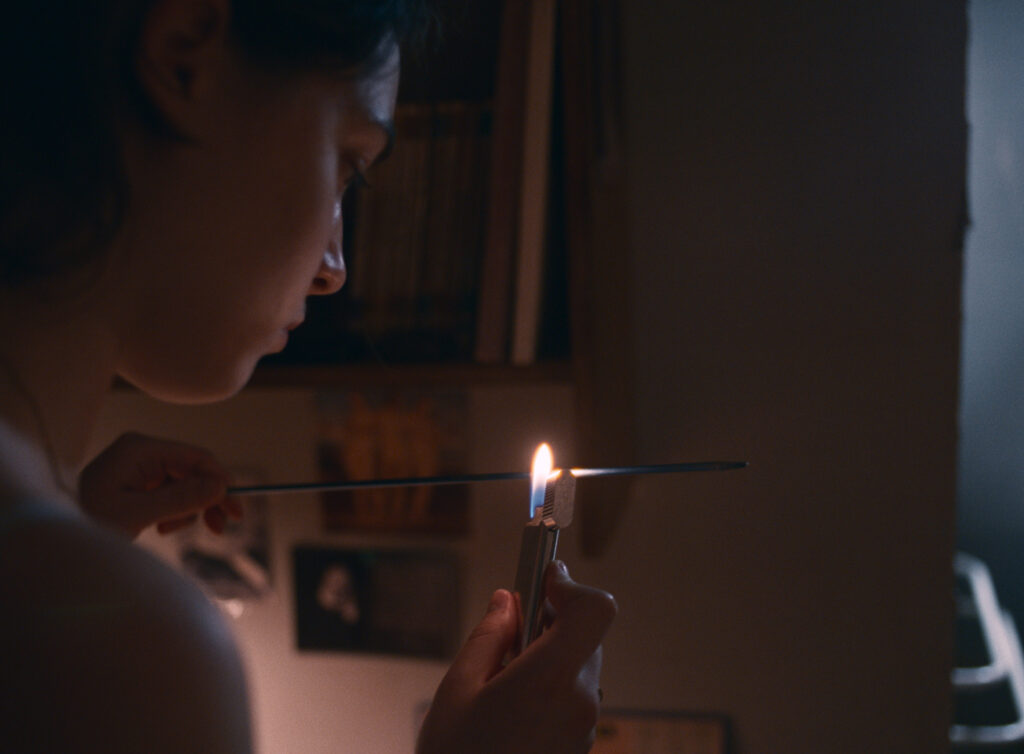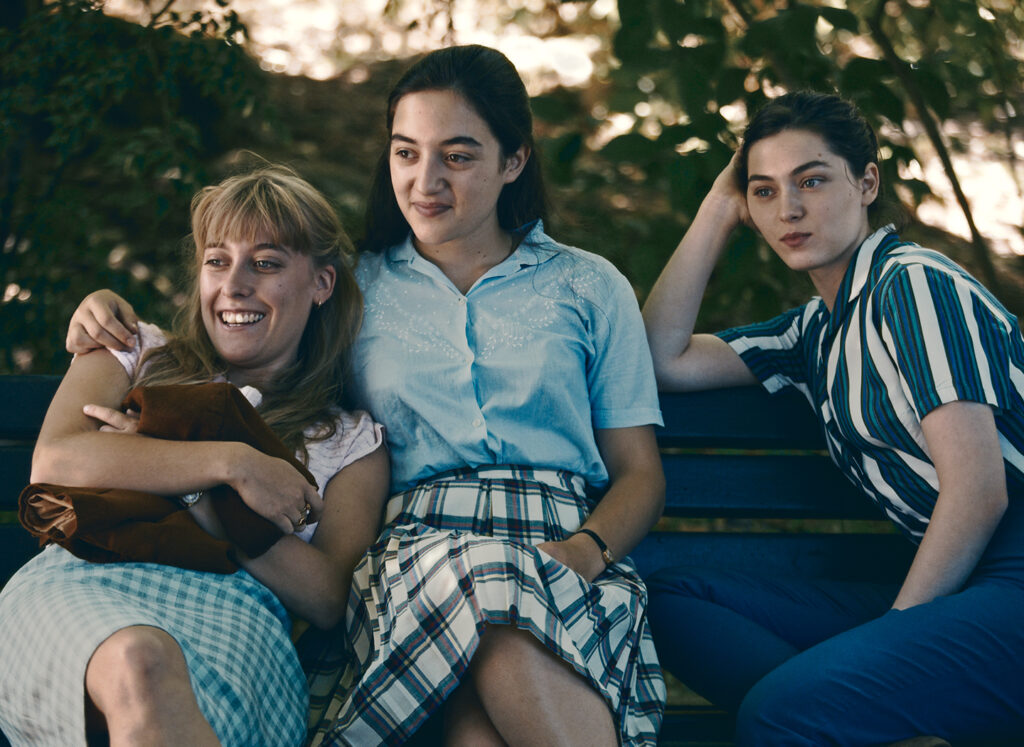May 29, 2022
by Carla Hay

Directed by Audrey Diwan
French with subtitles
Culture Representation: Taking place in France, in 1963, the dramatic film “Happening” has an all-white cast of characters representing the working-class and middle-class.
Culture Clash: A literature student, who is close to graduating from college, experiences an unplanned and unwanted pregnancy, and she becomes increasingly desperate to get an abortion, which was illegal in France at the time.
Culture Audience: “Happening” will appeal primarily to people who are interested in realistic movies about what women with unwanted pregnancies often have to go through when it is illegal to get an abortion.

Based on a true story, the realistic drama “Happening” shows without judgment what a college student in 1963 France experienced when she wanted to terminate an unplanned pregnancy, at a time when abortion was illegal in France. It’s not a movie that takes sides in the abortion debate, but it does show that people can look at the same story and have different views of who gets to decide which life is interrupted when a pregnant woman wants to terminate her pregnancy. Although the protagonist of “Happening” grows increasingly desperate to have an abortion, the movie admirably does not put forth the usual melodramatic hysterics that are often in dramas with the same subject matter.
Directed by Audrey Diwan, “Happening” is based on Annie Ernaux’s 2001 novel of the same name. Although the “Happening” book is a work of fiction, it’s inspired by Ernaux’s real-life experiences of when she had an unplanned and unwanted pregnancy when she was a college student in the early 1960s in France. Diwan and Marcia Romano co-wrote the adapted “Happening” screenplay. “Happening” won the Golden Lion Award (the top prize) at the 2021 Venice International Film Festival.
“Happening” (which takes place in 1963 in an unnamed part of France) begins with three university roommates/best friends getting ready for a carefree night out at a local pub. All three pals attend Cité Universitaire and live on campus. Anne Duchesne (played by Anamaria Vartolomei) is the most independent and ambitious of these three pals. She’s a literature major at who is very intelligent and who excels in her literature classes. Anne, who is 22 and will turn 23 on September 1, is in her last year of studies before she graduates.
Anne’s two roommates/best friends at the school are extroverted Brigitte (played by Louise Orry-Diquéro) and introverted Hélène (played by Luàna Bajrami), who have immense admiration and loyalty to Anne, because they think she’s the smartest and emotionally strongest out of all three of them. Anne is loyal to her friends too, but she’s more guarded about what she tells them about her love life. On this particular night, the three friends aren’t thinking about much except going to the pub to dance, drink alcohol, and possibly meet some men they might want to date.
At the bar, Anne shows that she’s not willing to go with any man who pays attention to her. A guy tries some pickup lines on her, and she just walks away. One of the other people at the bar is her closest male friend Jean (played by Kacey Mottet-Klein), so she goes over to talk to Jean after she rejects this potential suitor. For the rest of the night, Anne is content to just spend time dancing with her friends.
Life won’t be so lighthearted for Anne when she goes for a routine visit with her gynecologist, Dr. Ravinsky (played by Fabrizio Rongione), who asks her if she’s had sex in the past month. Anne knows that she has missed her latest menstrual period, but she says hasn’t had sex in this time period. The doctor knows that she’s lying, because he then drops bombshell news on her: Anne is four weeks pregnant.
Anne tells the doctor that she doesn’t want to be pregnant. She pleads with Dr. Ravinsky to “do something.” However, the doctor refuses because he says that he could lose his medical license for performing or being involved with an illegal abortion. The rest of the movie chronicles Anne’s journey as she tries to terminate her pregnancy.
Over the course of the movie, viewers find out who else Anne tells about her secretive pregnancy. Anne also shows that she’s not the self-pitying type and has a lot of pride about solving her own problems. There comes a point when someone offers to give her money for an abortion, but Anne refuses this offer and instead decides to sell many of her possessions to get the money.
“Happening” also has an unflinching portrayal of the emotional and physical toll that this unwanted pregnancy takes on Anne. Her grades start to suffer. She has problems sleeping and eating. And, not surprisingly, when she can’t find a doctor to give her an abortion, she looks into more dangerous options. “Happening” also prefaces scenes with captions showing how many weeks Anne is pregnant, thereby increasing the tension in seeing what’s going to happen next.
The movie also shows the realities that although men often like to dictate what women and girls should do about unwanted and unplanned pregnancies, these women and girls (especially those who don’t have partners) are often really on their own. And they frequently get shamed by people (of any gender) for having unwanted pregnancies, while the men who get the women or girls pregnant are not judged as harshly. This shaming happens to Anne. It comes from catty female students, who see her in a public shower and call her a “loose woman” because they notice that she looks pregnant.
And it also comes from people whom Anne thinks are supposed to help her. During another appointment with Dr. Ravinsky, Anne explains why she’s not ready to become a mother at this time in her life: “I’d like a child one day, but not instead of a life [of my own]. I could hate the kid for it.” Dr. Ravinsky then tells her in a condescending tone to go through with the pregnancy: “Accept it. You have no choice.” Anne doesn’t believe that she has “no choice.”
Anne experiences paranoia and mistrust, because she is at risk of being arrested if she gets caught having an abortion or trying to get an abortion. She finds a medical professional in the phone book named Dr. Guimet (played by François Lorique), who seems willing to help her, but then he tells Anne how much he charges for medication to induce a miscarriage. What Anne experiences with Dr. Guimet is an example of how licensed medical professionals can take advantage of pregnant women and girls who are desperate to terminate their pregnancies.
By showing Anne’s pregnancy journey, “Happening” starkly presents the question: “When a man gets a woman pregnant and doesn’t want the child either, how much should he get involved with what the woman should do about the pregnancy?” There are no easy answers, of course, because a lot depends on the circumstances and the people.
The father of Anne’s child isn’t revealed until about halfway through the movie. His name is Maxime (played by Julien Frison of the Comédie-Française), a political science student whom Anne met at a bookstore while he was visiting from Bordeaux. Anne’s pregnancy is a result of her and Maxime’s brief fling. Maxime’s reaction to this pregnancy news is exactly what most people might expect from a college student who doesn’t think he’s ready to become a parent. However, Maxime is hurt and confused that Anne didn’t tell him sooner, because he thinks he should’ve had a say in her decision.
Vartolomei’s performance as Anne makes this movie worth watching because it’s riveting in all of its nuances. (It’s easy to see why Vartolomei won the Best Female Newcomer prize at the 2022 César Awards, which is the French version of the Academy Awards.) Anne has a quiet determination to do what she thinks needs to be done while she tries to hold on to some dignity in a system that often tries to make her feel powerless and demeaned. Perhaps as a way to deal with the stress, Anne sometimes acts like she wants to forget that she’s pregnant. But she can’t ignore her pregnancy, and her decision about what to do leads her down a path that’s terrifying for her.
“Happening” is not an easy movie to watch in the scenes where Anne’s desperation leads her to do some extreme things. Abortion has been a divisive political issue, but what most people can agree on is that it’s also an important health issue. “Happening” shows that whether abortion is legal or not, a decision on what to do about an unwanted pregnancy comes with an emotional cost that cannot be regulated by any laws.
IFC Films released “Happening” in select U.S. cinemas on May 13, 2022. The movie is set for release on digital and VOD on June 21, 2022. “Happening” was released in France and other countries in Europe in 2021.


